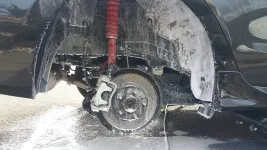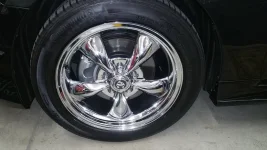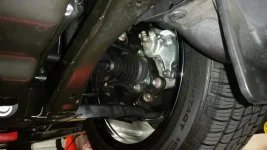You are using an out of date browser. It may not display this or other websites correctly.
You should upgrade or use an alternative browser.
You should upgrade or use an alternative browser.
Compressing pistons
- Thread starter xgmad
- Start date
- Status
- Not open for further replies.
AutoMechanic
Site Donor 2025
Shouldn’t damage the ABS Pump. I always loosen the cap of the master cylinder reservoir I’d definitely do that.
When I compress brake caliper pistons, I crack open the bleeder for that caliper and force the old fluid out (into a suitable container, via a clear vinyl hose). When I am done with the brake work, I either bleed the brakes, or simply top off the reservoir (depending on fluid age).
I really dislike sending the old fluid from inside the calipers back up through the ABS pump. Further, forcing the fluid through the bleeder takes less effort than back up through the system. Win-win.
I really dislike sending the old fluid from inside the calipers back up through the ABS pump. Further, forcing the fluid through the bleeder takes less effort than back up through the system. Win-win.
Depending on the vehicle generally there is not enough brake fluid that compressing the brake caliper piston would ever reach the ABS. Even the caliper closet the hydraulic line distribution block. I presume that you are at least doing a basic caliper bleed with new brake fluid after the brake service ?
As always try to find a factory service procedure to double check the service before beginning. Or if you have a friend that can access AllData or similar program and download the procedure for your exact application.
As always try to find a factory service procedure to double check the service before beginning. Or if you have a friend that can access AllData or similar program and download the procedure for your exact application.
This! Even the fluid in the lines going to the caliper are going to have old dirty fluid in them, compressing the piston will push a like amount right into the ABS unit ditto reverse bleeding. Reverse bleeding should be done only after the system has been flushed out with clean fluid when nothing else will work to get the air out (rare, usually mostly on old clutch systems).When I compress brake caliper pistons, I crack open the bleeder for that caliper and force the old fluid out (into a suitable container, via a clear vinyl hose). When I am done with the brake work, I either bleed the brakes, or simply top off the reservoir (depending on fluid age).
I really dislike sending the old fluid from inside the calipers back up through the ABS pump. Further, forcing the fluid through the bleeder takes less effort than back up through the system. Win-win.
Triggering the ABS unit with a scan tool is another alternative if the tool is available and the vehicle can be done that way.
xgmad
Thread starter
- Joined
- Feb 6, 2021
- Messages
- 1,412
Yes of course, its going to have new brake fluid after the brake work is done.I presume that you are at least doing a basic caliper bleed with new brake fluid after the brake service ?
xgmad
Thread starter
- Joined
- Feb 6, 2021
- Messages
- 1,412
The brakes haven't been touched at all, all 4 are shot , and I will just unscrew cap and then just compress it, its only 2 to 3 cm I think for pistonI will say that if it were a "FULL " service with a complete brake fluid flush and replacement then there is a proper and safe service to perform it and is advised.
My only addition is to check the calipers—rears sometimes need to have the piston turned in, not pressed.
Speaking of rear calipers, I seem to be 50-50 on them going bad after a pad slap. Sometimes they work just fine, but often they need replacement i. short order due to seizing. YMMV. My time is “free” and I try to check for dragging brakes whenever I remember, so I usually don’t change calipers until I know it is bad.
Speaking of rear calipers, I seem to be 50-50 on them going bad after a pad slap. Sometimes they work just fine, but often they need replacement i. short order due to seizing. YMMV. My time is “free” and I try to check for dragging brakes whenever I remember, so I usually don’t change calipers until I know it is bad.
You cant be serious, you want me to go chasing down simple and well known facts. It doesn't matter if the line in a full system is 2 inches or 2 miles long or 1/8 inch in diameter or 8 inches in diameter if you put an ounce or a gallon in one end the same exact amount is coming out the other end. It may take longer to get there but it will, that is elementary school stuff, we are not talking about Pascal's principle which is the trasference of force in relation to piston displacement but even there the amount of fluid moving between the cylinders is the same.This is not altogether accurate if you re-read what the OP had said in the first response. Please submit a Factory service advisory to support your response.
OR
For fluid volume estimates...
You should calculate how much a caliper cavity capacity for fluid is vs the line length and submit your calculation to support your response!
Please keep in mind the OP did not mention replacing the complete brake fluid in the system
Either way you would first need to know what the vehicle is being serviced.
I will say that if it were a "FULL " service with a complete brake fluid flush and replacement then there is a proper and safe service to perform it and is advised.
Pushing dirty contaminated fluid back into the ABS unit is bad practice without flushing the system out first, this is especially true and poses a higher risk in areas of high humidity or wet conditions like the rust belt or older vehicles which may have degraded components (hoses, internal rusting, etc). Astro was 100% accurate IMO.
Brake systems also accumulate sludge and metal particles over time. Disc brake hoses usually enter the caliper near the top of the caliper body. Similarly, the bleeder valve is located at the top of the caliper bore. If sludge accumulates in the caliper bore, it usually sinks to the bottom. During a brake pad service, pushing the caliper pistons back into the caliper bores without opening the bleeder valves may dislodge some of the sludge and distribute it throughout the system, possibly causing further damage. Similarly, stirring up sludge that has accumulated in the master cylinder reservoir by adding fresh fluid may cause it to get into the rest of the system, including ABS valves and pumps.
https://www.motor.com/magazine-summary/brake-shop-brake-system-flushing-october-2014/
.
Trav nice try but still not what I asked. And now your reaching.
so to repeat...
"Depending on the vehicle generally there is not enough brake fluid that compressing the brake caliper piston would ever reach the ABS. Even the caliper closet the hydraulic line distribution block. I presume that you are at least doing a basic caliper bleed with new brake fluid after the brake service ?
As always try to find a factory service procedure to double check the service before beginning. Or if you have a friend that can access AllData or similar program and download the procedure for your exact application."
And now according to the rules of this forum I have to let the OP decide what course of action they want to take!
so to repeat...
"Depending on the vehicle generally there is not enough brake fluid that compressing the brake caliper piston would ever reach the ABS. Even the caliper closet the hydraulic line distribution block. I presume that you are at least doing a basic caliper bleed with new brake fluid after the brake service ?
As always try to find a factory service procedure to double check the service before beginning. Or if you have a friend that can access AllData or similar program and download the procedure for your exact application."
And now according to the rules of this forum I have to let the OP decide what course of action they want to take!
I open the bleeders, simple, easier to compress the piston back in. As stated above, rears may need a tool to rotate the piston back in.
The biggest influence of any brake component regarding it function and service life is dirt accumulation. A good way to keep the brake calipers and pads working efficiently is to at least rinse them off once in a while with car wash and a good hose rinse.My only addition is to check the calipers—rears sometimes need to have the piston turned in, not pressed.
Speaking of rear calipers, I seem to be 50-50 on them going bad after a pad slap. Sometimes they work just fine, but often they need replacement i. short order due to seizing. YMMV. My time is “free” and I try to check for dragging brakes whenever I remember, so I usually don’t change calipers until I know it is bad.
I tend to go overboard on washing but I am trying not have to start putting a "mask" on my brake parts so they will not get CAR-VID.
Attachments
You never saw black or very dark brake fluid? Rubber hose deterioration is very common.Never seen dirt buildup, just rust.
Reaching? Come on man it is very basic, you push eg 3oz of brake fluid backwards from the caliper 3oz is going right into the ABS unit if one is used. Where do you think it goes, up in thin air? If the full of fluid (not compressible air) brake line was a mile long and you push 3oz of fluid down one end 3oz of fluid is coming out the other. If you cant understand that there is no point in going further.Trav nice try but still not what I asked. And now your reaching.
so to repeat...
"Depending on the vehicle generally there is not enough brake fluid that compressing the brake caliper piston would ever reach the ABS. Even the caliper closet the hydraulic line distribution block. I presume that you are at least doing a basic caliper bleed with new brake fluid after the brake service ?
As always try to find a factory service procedure to double check the service before beginning. Or if you have a friend that can access AllData or similar program and download the procedure for your exact application."
And now according to the rules of this forum I have to let the OP decide what course of action they want to take!
The chance of junk in the caliper getting to the ABS unit is small but this is 100% incorrect.
What exactly is the problem? If you see dirty fluid at the calipers, why would you want to push that junk back into the system? Get it out of there.generally there is not enough brake fluid that compressing the brake caliper piston would ever reach the ABS.
I flush the entire system every 2 years or when doing a brake job. This is a standard used by almost every Euro manufacturer and testing organization TÜV, Dekra, GTÜ, ect.
It is a judgement call, IMO. If the fluid has been serviced very regularly (every 2-3 years/20-30K) it is probably a non-issue to retract the piston without opening the screws.
If the fluid looks like used motor oil then I would be hesitant.
Regardless of the circumstances, at the minimum, I like to bleed the brakes after any pad service.
If the fluid looks like used motor oil then I would be hesitant.
Regardless of the circumstances, at the minimum, I like to bleed the brakes after any pad service.
Given where you are located there is little chance of running into these issues.It is a judgement call, IMO. If the fluid has been serviced very regularly (every 2-3 years/20-30K) it is probably a non-issue to retract the piston without opening the screws.
If the fluid looks like used motor oil then I would be hesitant.
Regardless of the circumstances, at the minimum, I like to bleed the brakes after any pad service.
Maybe, but I still see cars with dark brake fluid. As you previously mentioned, hoses still deteriorate and corrosion inhibitors wear out over time.Given where you are located there is little chance of running into these issues.
I think an inspection of the reservoir for sludge and visual condition of the fluid (any floaties) will give you a good risk assessment of the situation.
^^^^^It is a judgement call, IMO. If the fluid has been serviced very regularly (every 2-3 years/20-30K) it is probably a non-issue to retract the piston without opening the screws.
If the fluid looks like used motor oil then I would be hesitant.
Regardless of the circumstances, at the minimum, I like to bleed the brakes after any pad service.
I don't think there would be to many circumstance that when replacing a caliper that I would ever not replace the complete brake fluid in my or a customers vehicle? But that's not what the OP asked. So you are spot on..... TC
______________________________________________________________________________________________________________________________________________
Funny I am trying REAL fricken hard to follow an improved method of responding on this forum..... but there is still those members.....that challenge my patients.
ASE
Sure there is. Customer only approved the single caliper replacement and bleed.^^^^^^^^^
I don't think there would be to many circumstance that when replacing a caliper that I would ever not replace the complete brake fluid in my or a customers vehicle?
Labor time only contemplated bleeding the brake system and not a complete fluid replacement.
As well I live close to a frequently visited state of Nevada to Truckee, Lake Tahoe and RENO that means trip over the Sierra mountains during all kinds of weather condition and treated roads during the winter months. So we/I see lots of dirty corroded brakes and components. Also in the shop "always' as a courtesy check the fluid level and do a strip test of the customers brake fluid.Maybe, but I still see cars with dark brake fluid. As you previously mentioned, hoses still deteriorate and corrosion inhibitors wear out over time.
I think an inspection of the reservoir for sludge and visual condition of the fluid (any floaties) will give you a good risk assessment of the situation.
- Status
- Not open for further replies.
Similar threads
- Replies
- 6
- Views
- 511
- Replies
- 7
- Views
- 731
- Replies
- 14
- Views
- 347
- Replies
- 41
- Views
- 1K



